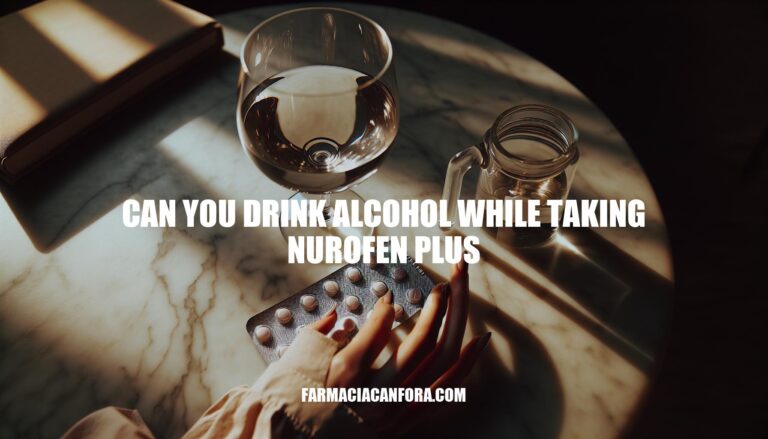


Mixing alcohol with medications like Nurofen Plus can be risky. Nurofen Plus contains ibuprofen and codeine, both of which can interact negatively with alcohol. Understanding these interactions is crucial for avoiding serious side effects such as gastrointestinal bleeding, liver damage, and increased sedation. Always consult a healthcare professional before combining alcohol with any medication.
Nurofen Plus is a medication used for the temporary relief of acute moderate pain and inflammation. It contains two active ingredients: Ibuprofen and Codeine phosphate.
Regarding alcohol consumption, it is advised not to drink alcohol while taking Nurofen Plus. Combining alcohol with this medication can increase the risk of side effects such as dizziness, drowsiness, and potentially serious complications like respiratory depression.
Drinking alcohol while taking Nurofen Plus (which contains ibuprofen and codeine) can lead to several serious risks and side effects:
Gastrointestinal Issues: Both alcohol and ibuprofen can irritate the stomach lining, increasing the risk of stomach ulcers and gastrointestinal bleeding. This risk is heightened when they are combined.
Kidney Damage: Ibuprofen can affect kidney function, and alcohol can exacerbate this effect. Together, they can significantly increase the risk of kidney damage.
Increased Sedation: Codeine is an opioid, and when combined with alcohol, it can lead to profound sedation, respiratory depression, coma, or even death.
Liver Damage: Both alcohol and codeine are metabolized by the liver. Combining them can increase the strain on the liver, potentially leading to liver damage.
Impaired Cognitive and Motor Functions: Both alcohol and codeine can impair cognitive and motor functions. When taken together, these effects are amplified, increasing the risk of accidents and injuries.
These risks highlight why it is generally advised against combining alcohol with Nurofen Plus. The combination can lead to severe health complications, making it important to avoid alcohol while taking this medication.
Combining alcohol with Nurofen Plus (which contains ibuprofen and codeine) is generally not recommended. Here are the key points:
Increased Risk of Side Effects: Mixing alcohol with Nurofen Plus can enhance side effects such as drowsiness, dizziness, and difficulty concentrating. Severe interactions can lead to respiratory issues, coma, or even death.
Gastrointestinal Issues: Both alcohol and ibuprofen can irritate the stomach lining, increasing the risk of gastrointestinal bleeding and ulcers.
Liver and Kidney Damage: Long-term use of ibuprofen with alcohol can significantly increase the risk of liver and kidney damage.
Specific Recommendations: It is advised to avoid alcohol entirely while taking Nurofen Plus. If you do consume alcohol, wait at least 24 hours after your last dose to minimize risks.
Always consult your healthcare provider for personalized advice.
When taking Nurofen Plus, it is crucial to avoid mixing it with alcohol due to the increased risk of serious side effects such as gastrointestinal bleeding, liver damage, and respiratory depression.
The combination can also lead to kidney damage, impaired cognitive and motor functions, and increased sedation.
It is advised to consult a healthcare professional for personalized advice on managing pain while minimizing risks associated with alcohol consumption.